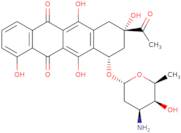Carubicin
CAS: 50935-04-1
Rif. 3D-ACA93504
| 1mg | Fuori produzione | ||
| 5mg | Fuori produzione | ||
| 10mg | Fuori produzione | ||
| 25mg | Fuori produzione | ||
| 50mg | Fuori produzione |
Informazioni sul prodotto
- (1S,3S)-3-acetyl-3,5,10,12-tetrahydroxy-6,11-dioxo-1,2,3,4,6,11-hexahydrotetracen-1-yl 3-amino-2,3,6-trideoxy-L-lyxo-hexopyranoside
- (1S,3S)-3-acetyl-3,5,10,12-tetrahydroxy-6,11-dioxo-1,2,3,4,6,11-hexahydrotetracen-1-yl 3-amino-2,3,6-trideoxy-alpha-L-lyxo-hexopyranoside
- (1S,3S)-3-acetyl-3,5,10,12-tetrahydroxy-6,11-dioxo-1,2,3,4,6,11-hexahydrotetracen-1-yl 3-amino-2,3,6-trideoxyhexopyranoside
- (8S,10S)-8-Acetyl-10-[(3-amino-2,3,6-trideoxy-α-<span class="text-smallcaps">L</span>-lyxo-hexopyranosyl)oxy]-7,8,9,10-tetrahydro-1,6,8,11-tetrahydroxy-5,12-naphthacenedione
- 5,12-Naphthacenedione, 8-acetyl-10-[(3-amino-2,3,6-trideoxy-α-<span class="text-smallcaps">L</span>-lyxo-hexopyranosyl)oxy]-7,8,9,10-tetrahydro-1,6,8,11-tetrahydroxy-, (8S,10S)-
- 5,12-Naphthacenedione, 8-acetyl-10-[(3-amino-2,3,6-trideoxy-α-<span class="text-smallcaps">L</span>-lyxo-hexopyranosyl)oxy]-7,8,9,10-tetrahydro-1,6,8,11-tetrahydroxy-, (8S-cis)-
- Antibiotic R 588A
- Carminomicin I
- Carminomycin I
- NSC 180024
- Vedi altri sinonimi
- Nci 180024
- 5,12-Naphthacenedione, 8-acetyl-10-[(3-amino-2,3,6-trideoxy-α-L-lyxo-hexopyranosyl)oxy]-7,8,9,10-tetrahydro-1,6,8,11-tetrahydroxy-, (8S-cis)-
- (8S,10S)-8-Acetyl-10-[(3-amino-2,3,6-trideoxy-α-L-lyxo-hexopyranosyl)oxy]-7,8,9,10-tetrahydro-1,6,8,11-tetrahydroxy-5,12-naphthacenedione
- 5,12-Naphthacenedione, 8-acetyl-10-[(3-amino-2,3,6-trideoxy-α-L-lyxo-hexopyranosyl)oxy]-7,8,9,10-tetrahydro-1,6,8,11-tetrahydroxy-, (8S,10S)-
Carubicin is an antitumor antibiotic that belongs to the group of anthracyclines. It is a prodrug that is activated by myeloperoxidase in the presence of hydrogen peroxide and chloride ions. The cytotoxic effect of carubicin is related to its ability to bind to DNA and inhibit protein synthesis, which leads to cell death. Carubicin also binds with high affinity to epidermal growth factor receptor on tumor cells, leading to inhibition of tumor cell proliferation. Carubicin has been shown to be effective for the treatment of subcutaneous tumors in mice.





